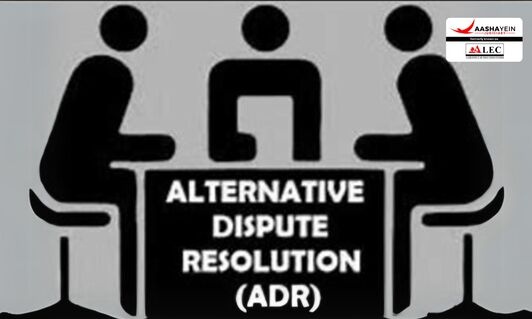Alternative Dispute Resolution (ADR) is a flexible process for resolving disputes without involving formal court proceedings. Its primary aim is to provide justice that is more affordable, accessible, and efficient. ADR methods are non-judicial, focusing on resolving legal issues through mutual agreement between the parties. This approach is driven by the principle that "justice delayed is justice denied." ADR is particularly beneficial for corporate sectors and economically disadvantaged individuals, offering a speedy, transparent, and adaptable mechanism to address conflicts effectively.
Understanding ADR
Alternative Dispute Resolution (ADR) is a process that facilitates the resolution of disputes between parties through dialogue and negotiation, aiming to achieve a mutually acceptable solution. ADR employs various tools and techniques to address conflicts in areas such as family, business, and civil matters. The core principle of ADR is the involvement of a neutral third party to assist in resolving disputes. Unlike adversarial litigation, ADR emphasizes cooperation, allowing parties to understand each other's perspectives and work towards maintaining harmony and collaboration. Additionally, ADR helps reduce the burden on courts by providing an alternative mechanism for dispute resolution.
You can also read the latest judgment by visiting [Latest Judgment].
For more information, visit [Aashayein Enquiry Section]
Understanding section 89 of the code of civil procedure 1908
Section 89 of The Code of Civil Procedure 1908 provides that-
“Where it appears to the Court that there exist elements of a settlement which may be acceptable to the parties, the Court shall formulate the terms of settlement and give them to the parties for their observations and after receiving the observations of the parties, the Court may re-formulate the terms of a possible settlement and refer the same for:
- Arbitration;
- Conciliation;
- Judicial settlement including settlement through Lok Adalat; or
- Mediation.”
In the case of Salem Advocate Bar Association v. Union of India, the Supreme Court held that if the court identifies the potential for a settlement acceptable to the parties, it can require them to explore one of the Alternative Dispute Resolution (ADR) methods outlined in Section 89 of the Code of Civil Procedure, 1908.
Similarly, in Afcons Infrastructure Ltd. v. Cherian Varkey Construction Co. (P) Ltd., the Court clarified the legal framework for ADR methods. Arbitration, a key form of ADR, may occur when parties have previously agreed to resolve disputes through arbitration or when they submit an application or joint memo to the court in the absence of such an agreement. The outcome of the arbitration, whether through a court order or a settlement reached during the process, holds the same legal authority as a decision made by the arbitrator.
Importance of ADR in modern times
Alternative Dispute Resolution (ADR) is gaining popularity as a faster, more efficient, and cost-effective alternative to traditional court proceedings. One of its primary advantages is its affordability, as mediation and other ADR methods are typically much cheaper than litigation, reducing financial burdens on the parties involved. Additionally, ADR is often quicker, making it particularly useful for resolving smaller claims. However, for urgent matters like injunctions, traditional courts may still be more appropriate.
ADR is also non-adversarial, unlike court cases where one party wins and the other loses. It promotes mutual understanding by encouraging parties to discuss their perspectives and collaboratively reach a resolution. Furthermore, ADR provides greater flexibility, allowing disputes to be resolved through various means such as phone, email, letters, or face-to-face meetings, catering to individual preferences. These benefits make ADR an increasingly preferred mechanism for peaceful dispute resolution.
Conclusion
It is widely known that Indian courts face a huge backlog of cases due to limited resources, including inadequate manpower and infrastructure, as highlighted by the National Judicial Data Grid. The Supreme Court’s move to mandate ADR procedures under Section 89 of the CPC has significantly promoted the use of ADR in the country. However, there is still a need for the government to implement policies that simplify and streamline the ADR process for the parties involved.

